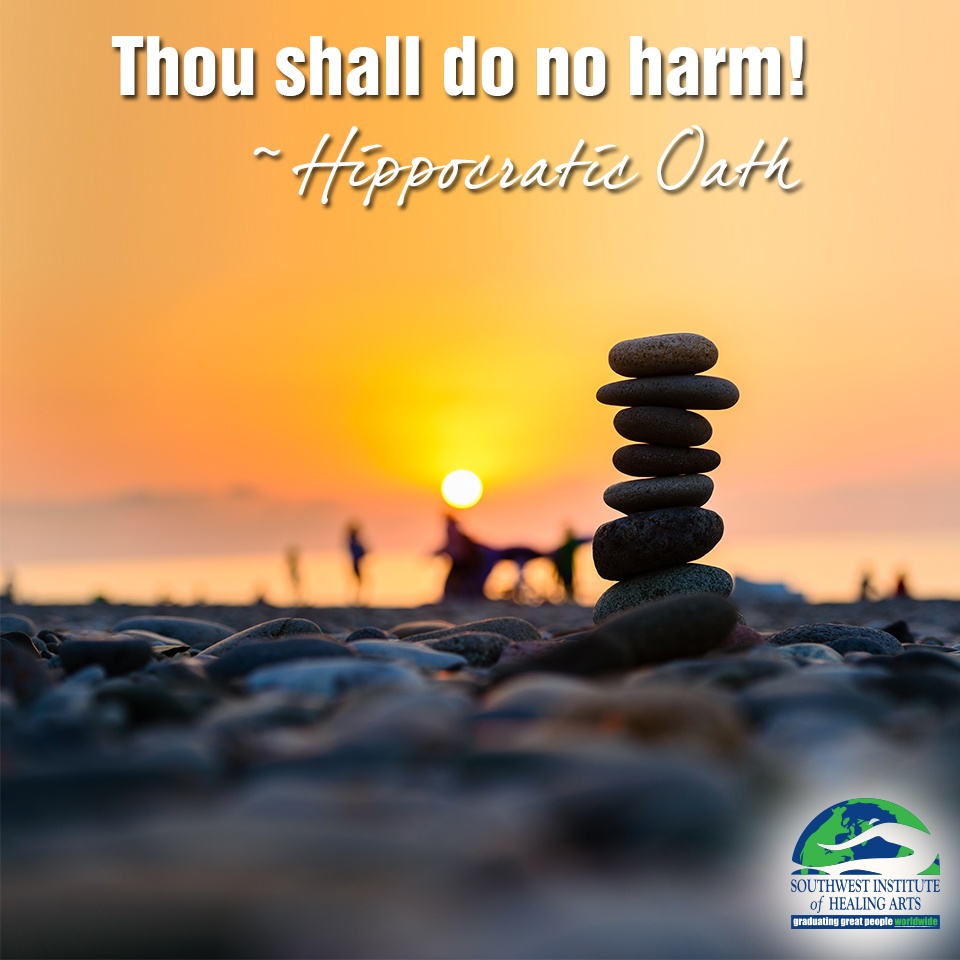Our hearts are extremely heavy as we read the news about the massage industry and those who have experienced misconduct and sexual assaults by Licensed Massage Therapists (LMTs). As a nationally accredited college with a 25-year history of providing massage therapy education, we believe it is our responsibility to take a clear stand on sexual harassment, violations of personal boundaries, and the kinds of unconscious behaviors that are how coming to light in the massage community.

Southwest Institute of Healing Arts (SWIHA) is resolved to be on the forefront of reminding, retraining, and encouraging all massage therapists to honor and recommit to the ethical oaths they took when they became an LMT. We seek to remind them that at each step of their journey toward becoming an LMT – from their first class, through graduation and licensure, and investing in massage liability insurance – they made and affirmed their commitment to ethical practice. Regardless of what stage of their journey they are at—whether having just graduated, having operated a thriving massage practice for many years, or working for employers – as massage therapists, it is our moral obligation to create safe and sacred space for the peace and healing of others.
 While LMTs take oaths as a matter of legality and professionalism—which also happens to be the exclusive focus of so many recent media reports—SWIHA believes there are deeper and more conscious reasons for following an ethical path. From the very beginning, SWIHA’s massage therapy training programs have been intrinsically tied to our spiritual foundation, much of which is based in yogic philosophy. At its very core, the message we instill in our students is simple: Do the “right” thing!
While LMTs take oaths as a matter of legality and professionalism—which also happens to be the exclusive focus of so many recent media reports—SWIHA believes there are deeper and more conscious reasons for following an ethical path. From the very beginning, SWIHA’s massage therapy training programs have been intrinsically tied to our spiritual foundation, much of which is based in yogic philosophy. At its very core, the message we instill in our students is simple: Do the “right” thing!
Underneath this simple affirmation – to do the” right” thing – is the deeper, spiritual concept of sankulpa – the Sanskrit word meaning ‘resolve.’ In practicing sankulpa, we are resolving to use our heart and mind in order to serve the greater good. We are making a commitment to live a disciplined life to promote harmony… a commitment which demands that we act in the “right” ways.
Yet, what exactly do we mean by “right”? We can define it in a full scope of ways:
- Right understanding: Seeking to understand our true nature and life purpose.
- Right thought: Acknowledging that our thoughts are words, pictures, or past experiences that are stored in our mind with accompanying feelings, which can give rise to both conscious and unconscious actions.
- Right speech: Avoiding slander, gossip, lying, and all forms of untrue, abusive, harmful, or hurtful speech.
- Right conduct: Adhering to the idea of nonviolence (ahimsa), as well as refraining from any form of stealing or sexual impropriety.
- Right means of making a living: Finding ways we can serve in the world in a loving, profitable, and ethical way.
- Right mental attitude or effort: Avoiding negative thoughts and emotions, such as pride, envy, jealousy, anger, greed, lust, gluttony, or sloth.
- Right mindfulness: Having a clear sense of one’s mental state and bodily health and feelings.
- Right concentration: Using meditation and single-pointed focus to strive for the highest levels of enlightenment and spiritual connection for the purpose of self-actualization or being in service to others.

What’s the message?
The message is to wake-up and hear the call to step into a new way of being. A call for a deeper, more committed way to stand up, speak up, and support others in a loving and conscious way in that morally, ethically, and spiritually benefits all of humankind.
As many of us are already sensing, October 2017 is quickly becoming a permanent thread in the fabric of the world’s consciousness. Surfacing information about sexual abuse across our nation—from Hollywood all the way to Washington, D.C.—has brought about a new understanding of just how prevalent this issue is and just how long it has gone unrecognized.
The two-word hashtag #MeToo has become one of the most successful social media activist movements in history. It has created a shift in how we show up through raising awareness of our individual thoughts and behaviors. It sends a message.
This is not merely about the physical harm that results from overt sexual misconduct. It is about the personal disrespect and emotional and spiritual devastation that can come from covert and unconscious behaviors between strangers, acquaintances, friends, partners, intimate relationships, and even family. While the physical harm from such unconscious actions is disturbing, the emotional misconduct and abuse can be equally as such.

When we invite our students, staff, graduates, and you to ‘do the right thing,’ we are speaking from the deepest part of our core values, which are expressions of the yogic yamas and niyamas.
Simply put, the yamas are ‘right’ things to restrain from doing, while the niyamas are ‘right’ things to do! Together, they form a moral code of conduct of the ‘right’ ways to be in the world. They are ways of being that encourage authentic and open connection to ourselves and others.
They can guide us in knowing the ‘right’ thing to do, whether we are a massage therapist, a yoga teacher, a holistic practitioner, or a conscious citizen of the world. They are self-regulating behaviors that govern our interactions with others along with personal practices that help us relate to ourselves. The yamas are nonviolence, truthfulness, non-stealing, non-greed, and non-excess. The niyamas are purity (of heart and mind), contentment, self-discipline and restraint, self-study and inner exploration, and surrendering or making a commitment to continue to the God of your understanding or a search for a higher understanding to what is right.
The yama known by the Sanskrit word of ahimsa or nonviolence, is very similar to the Hippocratic Oath – Thou shall do no harm, which is perhaps the most important vow of all as it relates to sexual misconduct. It reinforces our commitment to respect everyone’s boundaries.
 The fifth niyama, known by the Sanskrit word Ishwara pranidhana, means to dedicate our lives to serving the Divine Guidance that dwells within all beings; it is the invitation to move beyond all feelings of separateness. Ishvara pranidhana is designed to redirect our energy away from our selfish desires and personal dramas, towards the pursuit of Oneness and connection.
The fifth niyama, known by the Sanskrit word Ishwara pranidhana, means to dedicate our lives to serving the Divine Guidance that dwells within all beings; it is the invitation to move beyond all feelings of separateness. Ishvara pranidhana is designed to redirect our energy away from our selfish desires and personal dramas, towards the pursuit of Oneness and connection.
We imagine Ishvara Pranidhana as a part of every massage therapy curriculum and the foundation of every massage or yoga studio or private practice! Can you see it? We believe that shift would take ethical conduct in the massage industry to a higher level ! Can you feel it?
Please consider joining us in making a life-long sankulpa – making a solemn vow to do the ‘right’ things as a massage therapist, yoga teacher or holistic practitioner or any kind! We invite you to Say or pray ...
- I am committed to non-violence! Let me not harm anyone emotionally, psychologically, or physically with my thoughts, words, or actions!
- I am committed to truthfulness! May the words of my mouth and the song of my heart be kind, authentic, and accepting of all souls, including the Divine.
- I am committed to the non-stealing of property, personal dignity (mine or another’s), or anything that is not mine to have, hold, or covet.
- I am committed to non-greedy, non-possessiveness, and non-excessiveness in word and deed.
- I am committed to kindness and love! I will honor personal boundaries, creating safe and sacred space for all to whom I am honored to serve, and to avoid any form of sexual misconduct.
Let this be our solemn vow!
Important Note: Beyond the deeply rooted core values SWIHA holds at the center of its approach to students, education, and our community, SWIHA is dedicated to maintaining a safe environment for our students, faculty, and staff. As a nationally accredited college that participates in Title IV Federal Financial Aid, SWIHA adheres to the standards and procedures of Title IX, which seek to address and protect students’ educational experience and environment from the impacts of sexual harassment and abuse in all its forms.
Any student, faculty, or staff member who feels they have experienced sexual or gender-based harassment, please contact SWIHA’s Title IX Coordinator, Dr. Brad Bouté at bradb@swiha.edu or 480-393-1396. SWIHA takes all reports seriously and confidentially. Please find more information on our website: https://swiha.edu/title-ix-information/

